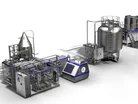US Bird flu Turns Spotlight on Milk Pasteurisation

An outbreak of avian ’flu in US dairy cattle has seen an increase in consumption of raw, unpasteurised milk, despite warnings about the possible health risks.
Since March 25, when the bird flu virus was confirmed in US cattle for the first time, weekly sales of raw cow’s milk have increased by 21% compared to a year ago, according to market research firm NielsenIQ.
As of Monday (May 20) 42 herds in nine US states were known to have cows infected with the bird flu virus, known as type A H5N1, federal officials said.
Pasteurised milk carries only fragments of the virus, which officials say pose no risk to consumers. Many, however, appear to be discarding that advice.
So far there have been no reported cases of a human contracting bird flu from raw milk, the sale of which is legal in 27 states.
Yet raw milk can contain a variety of disease-causing pathogens – including Listeria and E.coli – that the pasteurisation process kills.
Yet despite this, drinking raw milk is becoming more popular, with many believing unpasteurised milk can help build immunity against diseases such as bird flu.
Mark McAfee is founder of the Raw Milk Institute, and has said his phone has been “ringing off the hook”.
On the other side of the fence, Donald Prater of the Center for Food Safety and Applied Nutrition at the Food and Drug Administration has said he “strongly advises against the consumption of raw milk”.
Despite increased sales of raw milk, this is a drop in the ocean compared to sales of pasteurised milk, which hit 19.8 billion in 2023.
Tetra Pak: A pasteurisation giant
But what, exactly, is pasteurisation, and who are the main players in an industry that people know very little about.
Pasteurisation is the process of heat-treating milk, and then allowing it to rapidly chill, and takes its name from the French chemist and germ theory pioneer Louis Pasteur.
The most common method of pasteurisation in the US is High Temperature Short Time (HTST), which uses metal plates and hot water to raise milk temperatures to at least 161° F for no less than 15 seconds, followed by rapid cooling.
One of the leading companies in the pasteurisation industry is Tetra Pak, the Swedish multinational food packaging and processing company.
Tetra Pak is a major player in the pasteurisation industry, offering a range of pasteurisation equipment, including tubular pasteurisers, plate pasteurisers and sterilisers. These machines heat treat liquid food products – including milk, juice and other beverages – to eliminate harmful microorganisms and also extend shelf life.
As well as pasteurisation equipment, Tetra Pak provides pasteurisation services to food and beverage manufacturers.
It operates processing facilities equipped with state-of-the-art pasteurisation systems, allowing clients to outsource their pasteurisation needs. This service caters to businesses of various sizes, from small-scale operations to large-scale producers.
Tetra Pak's pasteurisation customers span a wide range of industries, including dairy, juice, and beverage sectors. Major dairy companies, juice manufacturers, and bottling companies rely on its pasteurisation solutions to ensure the safety and quality of their products.
Other major pasteurisation companies include:
- Fischer US, LLC
- DUE CI INOX srl
- Risto GbR
- DION Ltd.
- ETA Srl
- SPX Flow
- SOLDO Cavitators
- A.S.T.A eismann GmbH
- Omnia Della Toffola SpA
- Ekin Industrial
******
Make sure you check out the latest news at Food Digital
******
Technology Magazine is a BizClik brand.



